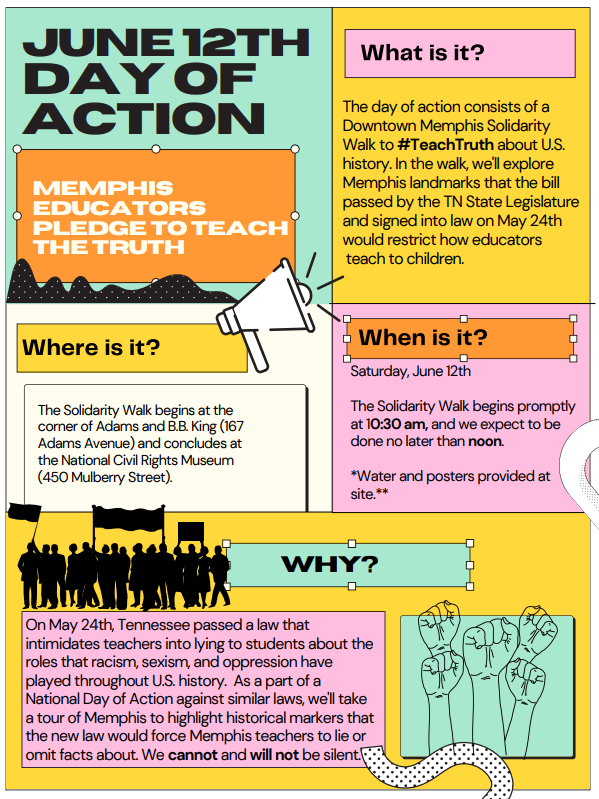On May 24th, 2021, the state of Tennessee approved a law that intimidates teachers into lying to students about the role of racism, sexism, and oppression throughout U.S. history.
As a part of a national day of action against similar laws being proposed in states nationwide, Tennessee educators will gather in downtown Memphis for a solidarity walk to highlight historical markers that describe events in Memphis history that teachers would be forced to lie or omit facts about in order to ensure compliance with the new law.
Day of Action Details: Memphis, TN
When: This Saturday, June 12th from 10:30 am – Noon
Where: Meet at the corner of Adams and B.B. King (167 Adams Ave), the site where Confederate General and Ku Klux Klan Grand Wizard, Nathan Bedford Forrest ran a slave market from 1854 to 1860. At 11am we’ll walk towards the marker for the 1866 Memphis Massacre at Army Park, and finish at the National Museum of Civil Rights.
What: Downtown Solidarity Walk to #TeachTruth about U.S. history in response to the law passed by the TN State Legislature and signed on May 24th. Across the country, state legislatures are pushing for laws that restrict teachers from giving accurate pictures of history. Those who join us walk in solidarity with the following pledge:
We the undersigned educators will not be bullied. We will continue our commitment to develop critical thinking that supports students to better understand problems in our society, and to develop collective solutions to those problems. We are for truth-telling and uplifting the power of organizing and solidarity that move us toward a more just society.
Organized by local educators in association with the Zinn Education Project and Black Lives Matter at School’s National Day of Action. The local organizers are educators who currently teach on the downtown lot once operated by KKK leader Nathan Bedford Forrest as a slave market. Educators, students, and all concerned Memphians are invited to join..
The Why: On May 24th, Tennessee approved a law that intimidates teachers into lying to students about the role of racism, sexism, and oppression throughout U.S. history.
The law brings the state government into our classrooms to restrict the ways teachers can discuss race, sexism, and oppression in American history. The law uses vague language to ban teachers from talking about racial/social privilege and responsibility for the effects of historical oppression in class. It bans teachers from including material that makes an individual feel “discomfort” when learning about race or gender in U.S. history. Unfortunately, a lot of American history is uncomfortable. But if it really happened, we should never lie to students in order to preserve comfort over truth. The law’s vague undefined language makes it even more of a problem.
For example, it includes language that bans teachers from any lesson that could promote “division between” racial groups, genders, social class or other affiliations. Imagine having to teach about the massacres, lynchings, and systemic oppression of Black Americans that all went unpunished by the U.S. Justice System — but instead of prioritizing historical fact and legacy, teachers must prioritize appeasing state regulations that ban divisive history, whatever that means.
Certain interpretations could clearly be weaponized to punish and persecute teachers who discuss social justice in class. At best, too much of the law is unnecessary and subjective. At worst, it purposefully hamstrings teachers from teaching real history to students. Either way, educators understand what this is, a threat from state politicians: teach the history we don’t like and you’re breaking the law in Tennessee.
Logistics: Meet at 167 Adams Ave (between Jefferson and Adams, at the corner of Adams and B.B. King). There is free public parking downtown on the weekend and the event will begin on the same lot as a Best Park Public Parking Lot. From 10:30am to 11:00am we will gather and hear from a few speakers. At 11:15am, we will begin the walk down mainstreet to Army Park. We’ll make a couple stops along the way, so we expect the walk to take about 30-45 minutes. Upon completion, attendees can take the Main Street trolley from the National Civil Rights Museum to Court Square, for a short walk back to their cars on the Best Park Lot.








Twitter
Google plus
LinkedIn